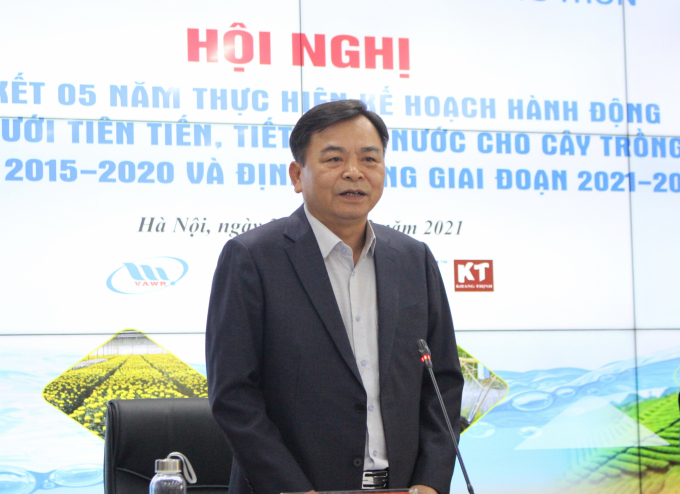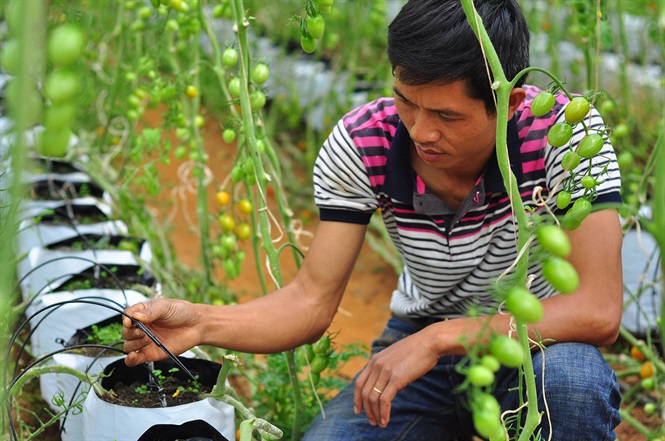June 15, 2025 | 21:02 GMT +7
June 15, 2025 | 21:02 GMT +7
Hotline: 0913.378.918
June 15, 2025 | 21:02 GMT +7
Hotline: 0913.378.918
Mr. Luong Van Anh, deputy director of the Directorate of Water Resources (MARD), said that the number of plants nationally that use advanced and water-saving irrigation has reached about 529,000 hectares (exceeding 6 percent of the proposed plan).

Deputy Minister of Agriculture and Rural Development Nguyen Hoang Hiep said that advanced and water-saving irrigation is a vital issue in improving the quality and value of agricultural production. Photo: Trung Quan.
Over the last year, the area of dry crops irrigated by water-saving irrigation has expanded dramatically. By 2015, the area has risen to 115,000 hectares, 150,000 ha in 2016, and 270,000 ha in 2017. By 2020, the area will have grown to 529,000 ha (up 91 percent compared to that of 2017 and 4.5 fold compared to that of 2015).
Southeast, the Central Highlands, the Mekong Delta, South Central, and North Central are the most developed regions in terms of modern and water-saving irrigation.
The irrigation method is primarily used for perennial crops (62%), which include several major crops such as coffee, tea, pepper, and a group of fruit trees (orange, mango, banana, and dragon fruit); annual crops (22%), which include several major crops such as sugarcane, cassava, and maize; and vegetables and flowers (16%).
Mr. Luong Van Anh elaborated that advanced and water-efficient irrigation also helps enhance agricultural output efficiency and farmer income. As a result, depending on the crop and location, modern and water-saving irrigation appliances may boost agricultural yield by 10% to 50%.
Reduce labor expenses associated with irrigation and upkeep by 10% to 90% (mango 8-78 percent, orange 55-76 percent, pomelo 50-78 percent, dragon fruit 96 percent, vegetables 66-75 percent ). Increase the competitiveness of goods by boosting their consumption and exports by 3-60%; contributing to an increase in agricultural production efficiency of 10-30% and people's income by 10-50%.
In terms of effectiveness in terms of resource use (soil and land), the irrigation method saves 10-80% water compared to traditional irrigation, doubles agricultural production value per ha, increases plant structure conversion rate by 10-70% and contributes to a 5-100% reduction in fallow land in the locality.
Additionally, the method demonstrates efficacy in addressing drought, water scarcity, climate change, and environmental protection in several vulnerable regions, including the Central Highlands, Central Coast, Southeast, and Mekong Delta. Advanced and water-saving irrigation systems assist to decrease water scarcity, damage, and dangers in agricultural output by up to 80%; they also help to reduce environmental pollution by lowering fertilizer use (from 5% to 40%) throughout the cultivation process.
In terms of construction efficiency and long-term development of new rural areas, advanced irrigation and water-saving technologies, as well as technological solutions for seeds, fertilizers, and automation, all contribute to increasing per capita income, lowering the rate of poor households, significantly improving the appearance, and developing new rural areas...
Nguyen Hoang Hiep, Deputy Minister of MARD, emphasized that MARD has always insisted on reforming the irrigation system as the first step in restructuring the agricultural business. In
Promoting the use of advanced and water-saving irrigation technologies is critical in restructuring the irrigation system and establishing the finest infrastructure capable of fully servicing agricultural economic sectors such as crop and animal production growth.
"The period from 2015 to 2020 laid the groundwork for the irrigation industry to continue in the right path and prepare for the next stage, which will see the realization of advanced and water-saving irrigation beyond expectations." Nguyen Hoang Hiep, Deputy Minister, stressed.

Farmers in Da Lat City (Lam Dong) apply 4.0 technology to control water-saving irrigation systems to increase production efficiency. Photo: Le Khanh.
Apart from the successes, the deputy minister said that the program still has significant limits after six years of execution. In particular, management authorities and residents in certain places continue to have a superficial, subjective, and false view of modern irrigation and water preservation. As a result, no systematic investment has been made from scientific research to application direction...
Additionally, during the last five years, several guidelines and regulations have been developed to promote the development of sophisticated and water-saving irrigation, but implementation capacity remains limited, with relatively few local governments funding the effort. As a consequence, resources are scarce, and if there are sufficient resources, they are not implemented methodically.
On that premise, the Deputy Minister proposed that the Directorate of Water Resources execute radical solutions between 2021 and 2025.
"The central issue is how to ensure that the direction and operation of state management agencies foster a favorable ecosystem and circumstances to help people realize the critical role of enhanced irrigation and water-saving in boosting the quality and value of agricultural products. Implementing the program in a meaningful manner but not chanting slogans "Deputy Minister Nguyen Hoang Hiep highlighted.
Additionally, the Deputy Minister recommended that the directorate analyze and re-evaluate all issues (with precise numbers), as well as the duties assigned to each relevant unit for implementation coordination. The directorate will be unable of deploying it effectively on its own.
The program's name should be adjusted to "smart irrigation" to entice participants while avoiding subjective and superficial views.
Create orientations and plans for the program to be applied to all crops, not only dry crops. When introducing new technologies into the world, it is critical to thoroughly assess if they are appropriate for Vietnam's circumstances to prevent mechanical stereotypes, since each country's natural environment is unique. Concentrate on the publication of standards and guidelines for implementation... Only then can the forthcoming period's adoption of a new strategy for saving water and enhanced irrigation be successful.
Mr. Luong Van Anh, Deputy Director of the Directorate of Water Resources, highlighted the development path for sophisticated and water-saving irrigation for dry crops between 2021 and 2025. It aims to increase the area of dry crops irrigated with advanced and water-saving techniques from 700,000 to 800,000 ha (approximately 30% of irrigated dry crop area) by 2025, in order to increase the added value of agricultural production, reduce irrigation water consumption, and increase household income, all while contributing to water security.
Concentrate on establishing, revising, and augmenting existing plans, as well as executing the formation of regional and provincial irrigation master plans after adoption of "Plan for the prevention and management of natural disasters for the period 2021-2030, with a view to 2045". To link development to advanced and water-saving irrigation for upland crops based on regional and regional advantages, with a particular emphasis on key tree groups such as fruit trees (oranges, pomelos, dragon fruit, mangoes, bananas, pineapples, durians, avocado, rambutan, and custard apple), perennial industrial crops (coffee, pepper), annual industrial crops (sugar cane, peanuts, onions, and garlic), vegetables, and flowers.
Develop and implement standards, rules, technical recommendations, economic criteria, and methodologies for the development and design of innovative and water-saving irrigation for dry crops.
Translated by Linh Linh

(VAN) The working delegation from the Ministry of Agriculture and Environment conducted an important trip to the Netherlands to strengthen strategic partnerships and sustainable development in the agricultural sector.

(VAN) The letter ‘A Plea from the Ocean’ not only evokes emotion but also awakens the human conscience to the responsibility of protecting life on Earth.

(VAN) The Department of Agriculture in South Africa has announced the country’s first mass vaccination of poultry to prevent local birds from contracting avian influenza.

(VAN) Establishment of the Mekong Delta Regional Agricultural Linkage Center, aiming for a closed value chain, deep processing, trading platforms, and international market connectivity.

(VAN) Gia Lai province has recently recorded 460 rare species of animals and plants, contributing to forest conservation and biodiversity planning in the region.

(VAN) Ms. Caroline Beresford, New Zealand Ambassador to Vietnam, expressed confidence that agricultural cooperation between Vietnam and New Zealand will develop sustainably, be climate-resilient, and promote gender equality.

(VAN) Vietnam reaffirms its commitment to international cooperation in fostering sustainable and responsible fisheries while ensuring resilient livelihoods for small-scale fishing communities.